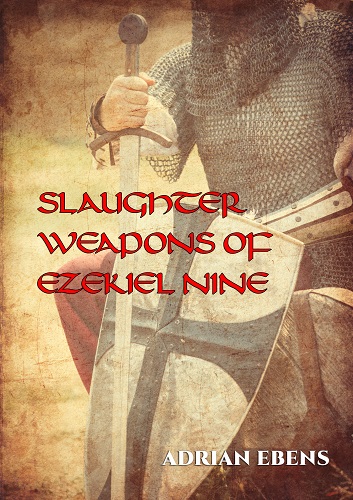Praise as a Two-Edged Sword?
Written by Melodee Kerr
 “Halleluyah. Sing unto YHWH a new song, and his praise in the congregation of the saints. Let Israel rejoice in him that made him: the children of Zion be joyful in their King. Let them praise his name in the dance: let them sing praises unto him with the timbrel and harp. For YHWH taketh pleasure in his people: he will beautify the meek with salvation. Let the saints be joyful in honor: let them sing aloud upon their beds. Let the high praises of El be in their mouth, and a two-edged sword in their hand; to execute vengeance upon the heathen, and punishments upon the people; to bind their kings with chains, and their nobles with fetters of iron; to execute upon them the judgment written: this honor have all his saints. Halleluyah.” Psalms 149
“Halleluyah. Sing unto YHWH a new song, and his praise in the congregation of the saints. Let Israel rejoice in him that made him: the children of Zion be joyful in their King. Let them praise his name in the dance: let them sing praises unto him with the timbrel and harp. For YHWH taketh pleasure in his people: he will beautify the meek with salvation. Let the saints be joyful in honor: let them sing aloud upon their beds. Let the high praises of El be in their mouth, and a two-edged sword in their hand; to execute vengeance upon the heathen, and punishments upon the people; to bind their kings with chains, and their nobles with fetters of iron; to execute upon them the judgment written: this honor have all his saints. Halleluyah.” Psalms 149
It is an honor for the saints to wield the sword of praise
When I came across Psalms 149 it was a completely new thought to me that praise was considered a two-edge sword in the hand of the saints as well as the thought that it was an honor for the saints to use this “weapon” as vengeance upon the heathen–that it would bind kings with chains and nobles with fetters of iron.
I had known that Jehoshaphat had appointed singers to walk in front of his army as they went out to meet an army that outsized them greatly. He commanded the singers to praise the beauty of holiness of YHWH, and when the choir began to sing praises YHWH worked mightily in their behalf and the enemy was taken care of (2 Chronicles chapter 20). My husband and I had used this concept in the past year of singing before a difficult moment and it was a blessing to us. However, I had never understood that our Father in heaven considered praise a two-edged sword for conquering the enemy in whatever form the enemy might take.
As I was reading through the Psalms, I came across Psalms 40:1-4 where it says that when we sing during trying times many shall see it, and fear, and shall trust in YHWH:
“I waited patiently for YHWH; and he inclined unto me, and heard my cry. He brought me up also out of an horrible pit, out of the miry clay, and set my feet upon a rock, and established my goings. And he hath put a new song in my mouth, even praise unto our Elohim: many shall see it, and fear, and shall trust in YHWH. Blessed is that man that maketh YHWH his trust, and respecteth not the proud, nor such as turn aside to lies.”
This concept led me to the story in acts where Paul and Silas where beaten and thrown into jail and placed in stocks. Amidst their trial they prayed and sang praises unto Elohim; all of the prisoners heard. Suddenly there was a great earthquake that shook the prison so much so that all the cell doors opened and all the fetters were loosed (undone). The keeper of the prison was about to kill himself because he figured that everyone would have escaped and he would have been held accountable, but Paul calls out “Do thyself no harm for we are all here”. The normal person in jail would have jumped at the opportunity to escape, but something in Paul and Silas’ testimony of prayer and praise had kept the inhabitants in their jail cells (Acts 16:22-28). This is similar to the sailors upon the shipwrecked boat who listened to Paul’s command to “stay with the ship” to be saved (Acts 27:31). I believe these stories illustrate the command in Psalms 149–that the praise of our heavenly Father gives “access” for the Father to work in our behalf by punishing the heathen and binding the kings and nobles of the people when we are in distress! The story of the jailer doesn’t end there–the Jailer was so happy that he brought Paul and Silas into his house and bathed their wounds. As Paul and Silas were being ministered to THEY ministered the gospel of salvation. The jailer and his household believed and were baptized that night.
Finally, I was reading in Revelation chapter one last night and again came across a description of the only begotten Son as High Priest in the heavenly sanctuary. Part of the description has never made sense to me. It states that “out of his [the Messiah's] mouth went a two-edged sword”. Now, if we visualize this we wonder what in the world John is trying to describe? What does it mean that a two-edged sword proceeds from the Son’s mouth? As I lay in bed, I realized that it is a picture of our High Priest praising His Father as He redeems us from our enemy–Satan!
Luke 15:7 says that there is more joy in heaven over one sinner that repents than over 99 just persons who need no repentance. As the Father now sings over everyone who comes to Him in repentance, I believe that when the saints are before His thrown He will sing over all of us corporately:
“YHWH thy Elohim in the midst of thee is mighty; he will save, he will rejoice over thee with joy; he will rest in his love, he will joy over thee with singing.” Zephaniah 3:17
Finding Psalm 149 was especially meaningful to me as this summer has been a pretty difficult summer. After I found this chapter in June I began at the first Psalm and began underlining every verse about praise in the color orange. To me it was a happy color and would compliment the other colors I already use. Finding praise texts were a life saver to me. I looked at some of my old studies a couple of years back and I had started one on praise as well. So what I will do in the upcoming weeks is share different verses on praise according to different topics and hope that it will be a blessing to you as it was to me.





